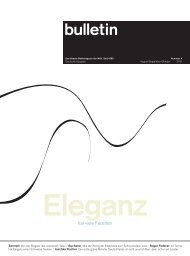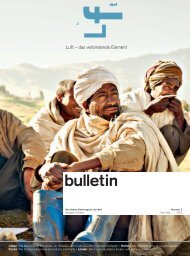Security & Conflicts
Global Investor Focus, 02/2006 Credit Suisse
Global Investor Focus, 02/2006
Credit Suisse
Create successful ePaper yourself
Turn your PDF publications into a flip-book with our unique Google optimized e-Paper software.
GLOBAL INVESTOR FOCUS <strong>Security</strong> & <strong>Conflicts</strong> — 50<br />
nomy grew at a faster pace than ever before in the history of<br />
mankind. Global gross national product – as measured in real<br />
terms – grew sixfold during that era, with an average annual real<br />
growth rate of roughly 4%. By comparison, in the periods 1500 to<br />
1820 and 1820 to 1950, the average annual real growth rates merely<br />
stuttered at around 0.3% and 1.5%, respectively.<br />
Wealthy nations were not the only countries that benefited from<br />
the fruits of globalization in the second half of the last century.<br />
On the contrary: during the period 1950 to 2000, Asia (excluding<br />
Japan) and Latin America – with respective real annual GDP growth<br />
rates of more than 5% and slightly more than 4% – recorded even<br />
stronger economic growth than Europe and North America. Africa<br />
was the only region that fell somewhat short, generating real annual<br />
GDP growth of approximately 3.5%, which nonetheless noticeably<br />
outstripped the 2.7% rate registered in the first half of the<br />
20th century. Globalization has provided the means for more people<br />
to live a longer and better life today than ever before in the<br />
history of the world. The average life expectancy for newborns in<br />
Africa rose from 38 to 52 years and in Asia from 40 to 66 years in<br />
the period 1950 to 2000. And although mass poverty is far from<br />
being eradicated, it has been reduced. In 1978, roughly one-third<br />
of the world’s population lived on less than USD 2 per day. Today<br />
that figure is about 20%.<br />
Globalization will continue to prevail, and it will likely accelerate<br />
rather than decelerate. The process will have more of an impact on<br />
the lives of a majority of people, rather than just on a minority. Globalization<br />
will incorporate more and more sectors, and new sectors,<br />
particularly in area of services, such as education, health care or<br />
the insurance industry. The process of globalization will further<br />
improve the absolute standard of living in all regions of the world.<br />
Not all people, however, will be able to reap equally the fruits of<br />
globalization. The gap between rich and poor will continue to widen,<br />
and not just in terms of the disparities in wealth among countries.<br />
This gap will also prevail – and perhaps particularly with regard to<br />
the disparities in wealth within countries – between people who<br />
swiftly and successfully adapt to new challenges, and people who<br />
are incapable or unwilling to react to such challenges.<br />
The catch-up process in Latin America and Asia sparks considerable<br />
fear in the leading affluent countries of today because<br />
these nations are losing the economic edge they have enjoyed for<br />
so long. They are fearful because they face hard and hungry competitors<br />
on the global market. And they are apprehensive because<br />
countries in Central and Southeast Asia produce goods and services<br />
that are almost always cheaper, occasionally better and sometimes<br />
both cheaper and better than those produced in Europe. As<br />
a consequence, more and more jobs in Europe are coming under<br />
greater competitive pressure. Reactionary national protectionism<br />
is gaining popularity while many call for safeguards. The collapse<br />
of World Trade Organization (WTO) negotiations at the end of July<br />
2006 underscores just how precarious and fragile is the consensus<br />
that open markets are better than closed, and multilateral treaties<br />
are better than bilateral agreements.<br />
Polluted water, clean air, conservation of the tropical rain forest,<br />
preservation of the habitats of rare animals, child labor or prolonged<br />
working hours: the losers of the North have apparently become<br />
“spokesmen for poor countries,” according to one of the world’s<br />
leading economists, Jagdish Bhagwati, from India. Mr. Bhagwati<br />
said, “In reality, however, the views that are presented here are<br />
not those of the poor countries – but [the] views [of the rich].”<br />
The prevailing concern among the wealthy nations is that they will<br />
be simply overrun by international trade. It is historical irony that<br />
today the West is hindering the rise of new rivals with the argument<br />
of unfair competition. For a long time, the same argument<br />
had been used the other way around by the poor nations, which<br />
had lamented the unfair competition, exploitation and displacement<br />
they suffered at the hands of rich countries, the market supremacists.<br />
However, protective fences no longer provide a bulwark<br />
against the powerful wave of globalization. Competitors from all<br />
around the world will no longer allow themselves to go back into a<br />
cage from which they have just been set free.<br />
Structural change is a perennial in the history of mankind. Sometimes<br />
it grows at a faster pace, and sometimes at a somewhat<br />
slower pace. But at the outset of the 21st century, structural<br />
change is burgeoning. In the era of globalization, there are many<br />
winners. However, there are also many people who believe that<br />
they are worse off, not just because they have less in absolute<br />
terms, but also because the gap between rich and poor has become<br />
wider. Some engage in more or less peaceful protests, venting<br />
their anger in the form of demonstrations and strikes. Others<br />
pursue a more aggressive path. Societies are, to a greater extent,<br />
confronted with the problem that people who see themselves as<br />
losers in the process of economic development, are provoked into<br />
adopting militant behavior. The terror of 11 September 2001, the<br />
brutal attacks in Madrid and London, and other bombings of airplanes,<br />
trains or ships vividly bring to mind just how rapidly the<br />
conflict over the fruits of globalization can lead to an end of globalization.<br />
“I hear people say we have to stop and debate globalization. You<br />
might as well debate whether autumn should follow summer,” proclaimed<br />
Britain’s Prime Minister Tony Blair in his speech at the<br />
Labour Party conference in September 2005. Whether or not globalization<br />
incorporates ever-broader circles at an ever-increasing<br />
pace, and the tempo of structural change reaccelerates, will not<br />
be the decisive factors. What will be decisive is how people in all<br />
walks of life prepare in summer for the winter ahead, harvest<br />
their fields and preserve the yield in order to live through even the<br />
colder days without concern. Globalization presents a fascinating<br />
challenge although the pace of transformation will not immediately<br />
benefit everyone. Nevertheless, it should improve most of our<br />
lives. <br />
<br />
1<br />
See also article from Michael T. Klare on page 31 for a detailed analysis of resourceallocation<br />
conflicts<br />
2<br />
The source for all the data in this section is the Population Reference Bureau, 2006 World<br />
Population Data Sheet of August 2006.<br />
3<br />
IMF: Finance & Development, March 2006, page 46.

















